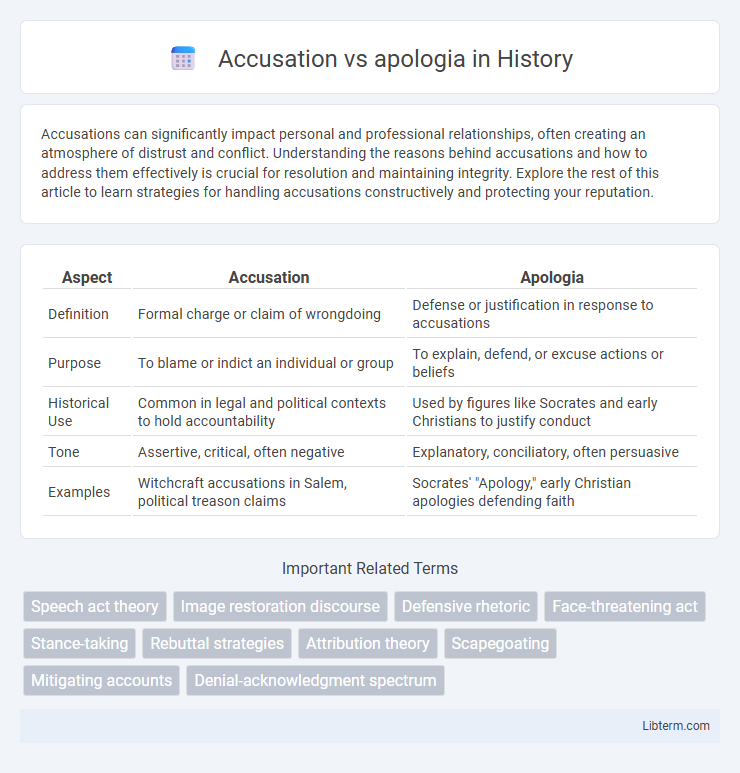Accusations can significantly impact personal and professional relationships, often creating an atmosphere of distrust and conflict. Understanding the reasons behind accusations and how to address them effectively is crucial for resolution and maintaining integrity. Explore the rest of this article to learn strategies for handling accusations constructively and protecting your reputation.
Table of Comparison
| Aspect | Accusation | Apologia |
|---|---|---|
| Definition | Formal charge or claim of wrongdoing | Defense or justification in response to accusations |
| Purpose | To blame or indict an individual or group | To explain, defend, or excuse actions or beliefs |
| Historical Use | Common in legal and political contexts to hold accountability | Used by figures like Socrates and early Christians to justify conduct |
| Tone | Assertive, critical, often negative | Explanatory, conciliatory, often persuasive |
| Examples | Witchcraft accusations in Salem, political treason claims | Socrates' "Apology," early Christian apologies defending faith |
Understanding Accusation: Definition and Context
Accusation refers to the act of claiming that someone has committed a wrongdoing or offense, often based on perceived evidence or suspicion. It involves assigning blame or responsibility within legal, social, or interpersonal contexts, which can significantly impact the accused's reputation and legal standing. Understanding accusation requires analyzing the intent, evidence, and context in which the claim is made to differentiate between legitimate charges and unfounded claims.
The Nature of Apologia: Meaning and Purpose
Apologia is a rhetorical strategy used to defend or justify actions, beliefs, or character in response to accusations or criticism. It aims to clarify misunderstandings, present evidence, and restore reputation by explaining motives or circumstances without necessarily admitting fault. The primary purpose of apologia is to persuade an audience of innocence or reasonableness, thereby mitigating damage to credibility.
Historical Perspectives on Accusation and Apologia
Historical perspectives on accusation and apologia reveal their critical roles in shaping social and political discourse across cultures. Accusation functions as a tool for establishing guilt or wrongdoing, often driving legal and moral consequences, while apologia serves as a strategic defense mechanism aimed at preserving reputation and legitimacy. The evolution of these concepts can be traced through classical rhetoric, where figures like Aristotle emphasized the importance of ethos in apologia and logos in accusation, reflecting ongoing tensions in public communication and justice systems.
Differences Between Accusation and Apologia
Accusation involves charging someone with wrongdoing or fault, often implying guilt without defense, while apologia is a formal defense or justification made to refute such charges. The key difference lies in their function: accusation asserts blame or responsibility, whereas apologia seeks to explain, excuse, or deny the allegations. In rhetoric and communication studies, understanding this distinction is crucial for analyzing conflict resolution, legal arguments, and public relations strategies.
Common Scenarios Involving Accusation
Common scenarios involving accusation often arise in legal disputes, workplace conflicts, and interpersonal relationships where trust is breached or misconduct is alleged. In these situations, individuals or entities face claims ranging from fraud and theft to ethical violations, requiring a clear presentation of evidence. Understanding the distinction between accusation and apologia is essential, as accusations assert guilt, whereas apologia involves a reasoned defense or justification against such claims.
Strategies and Forms of Apologia
Apologia strategies include denial, bolstering, differentiation, transcendence, and conciliation to counter accusations effectively. Forms of apologia manifest through public statements, speeches, media releases, and written communications aimed at restoring reputation and mitigating damage. Employing narrative reconstruction and credentials defense often strengthens the persuasive power of apologia in crisis communication.
The Role of Language in Accusation and Apologia
Language shapes the dynamics of accusation and apologia by framing intent, responsibility, and truth. In accusations, words are strategically employed to assign blame and evoke guilt, influencing perception and social judgment. Apologia utilizes rhetorical language to mitigate fault, justify actions, and restore reputation through persuasive narrative and emotional appeal.
Psychological Impacts of Accusation and Apologia
Accusation often triggers defensive psychological reactions such as anxiety, guilt, and lowered self-esteem, potentially leading to stress and social withdrawal. In contrast, apologia--a form of self-defense or justification--serves as a coping mechanism that can restore an individual's sense of control and reduce emotional distress by clarifying misunderstandings or accepting responsibility. Understanding these psychological impacts is vital for conflict resolution and improving interpersonal communication effectiveness.
Case Studies: Notable Accusations and Apologias
Notable accusations such as the Watergate scandal involving President Nixon and the Me Too movement's allegations against Harvey Weinstein highlight the intricate dynamics of public trust and accountability. Apologia cases like Richard Nixon's televised address and Bill Clinton's speeches during the Monica Lewinsky scandal showcase strategic rhetorical defenses aimed at mitigating reputational damage. These case studies demonstrate the critical role of contextual credibility, audience reception, and media influence in shaping the outcomes of accusations and apologia efforts.
Societal Implications and Future Trends
Accusation and apologia play crucial roles in shaping societal trust and justice by influencing public perception and accountability mechanisms. Accusations can mobilize social action and legal responses, while apologia serves to restore reputation and mitigate conflict, impacting social cohesion and institutional legitimacy. Future trends indicate a growing reliance on digital platforms for both accusation dissemination and apologia presentation, which intensifies the speed of social judgment and demands more transparent communication strategies.
Accusation Infographic

 libterm.com
libterm.com